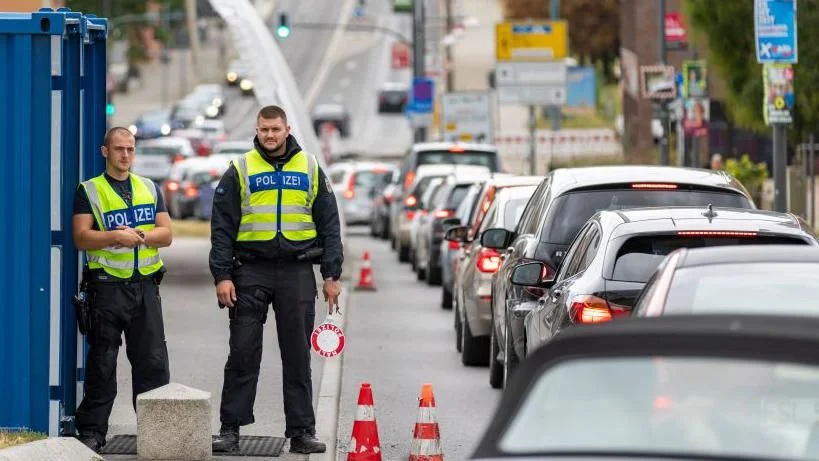In the past few years, Germany has seen more people entering the country without proper documents. Many of these people are coming from neighboring countries like France, Belgium, the Netherlands, and Denmark.
As the number of illegal immigrants has increased, Germany has decided to bring back border controls to try and manage the situation.
Lets look at why Germany made this decision, how illegal immigration affects the country, and what this means for the future of Europe. We’ll also talk about how other countries are reacting and the impact on the agreement that allows free travel across Europe.
Why Illegal Immigration is Rising
Germany is one of the largest countries in Europe and shares borders with many neighboring countries. Since 1985, most European countries have agreed to open their borders, allowing people to move freely without having to show their passports. This is called the Schengen Agreement.
But this open-border policy has made it easier for people to cross borders illegally. In 2023, Germany reported over 250,000 cases of people entering the country without proper documents.
Many of these people come from countries where there is war, poverty, or political problems. They hope to find better opportunities in Germany, but the huge number of arrivals has made it hard for the country to handle the situation properly.
For many immigrants, Germany is not the final stop. Some see it as a transit country to move to other parts of Europe. As a result, human smugglers have taken advantage of this situation to transport people illegally across borders, making it harder for the government to control immigration.
Germany’s Response: Border Controls
To tackle the issue, Germany has reintroduced temporary border controls with several neighboring countries. The new rules apply to France, Belgium, the Netherlands, Denmark, and others. Random checks are now being done to prevent illegal immigrants from crossing into Germany.
This change is meant to stop the rise in illegal immigration and make the country safer. But some people worry that this goes against the Schengen Agreement, which was designed to promote cooperation and freedom of movement in Europe.
Critics also argue that these border controls are a short-term solution, and bigger steps need to be taken to address the root causes of migration, such as war and poverty.
However, supporters of this move believe it is necessary to deal with the current crisis. They argue that without these controls, Germany will continue to face large numbers of illegal entries, which could harm the country’s security and resources.
Immigration Pressure from Neighboring Countries
Germany’s problem with illegal immigration isn’t just a German issue. Many migrants first enter countries like France, Belgium, and the Netherlands before heading to Germany. Because of this, Germany’s border controls are also affecting its neighbors.
France and Belgium, for example, are key routes for migrants who are trying to reach northern European countries like Germany and the UK. With Germany now tightening its borders, these countries are likely to face more pressure to control their own immigration systems.
Other countries that share borders with Germany, like Austria and Switzerland, have also introduced stricter border controls in recent years.
Austria, in particular, has dealt with high numbers of migrants because of its position on key migration routes from the Middle East and Africa. These countries support Germany’s decision to bring back border checks and believe it will help reduce illegal migration across Europe.
Political Change in Germany
Germany’s decision to bring back border controls is also a response to growing political pressure. In the past, Germany has been known as one of the most welcoming countries for immigrants. For example, in 2015, Germany allowed over one million refugees from war-torn countries like Syria to enter the country.
But since then, the political climate in Germany has changed. Rising support for far-right political parties, which want stricter immigration laws, has put pressure on the government.
Many Germans are concerned about the impact of immigration on the economy and security, leading the government to rethink its policies.
In recent years, there have also been several incidents involving immigrants that have raised concerns about safety and security. Some believe that the large number of arrivals has overwhelmed Germany’s ability to handle the situation properly. These concerns have led to increased public support for stronger border controls.
How This Affects The Schengen Agreement On Free Movement in Europe
Germany’s decision to reintroduce border controls is a challenge to the Schengen Agreement, which has allowed for free movement across most of Europe for decades. The Schengen Agreement has made it easier for people to travel, do business, and trade across borders without needing to show their passports.
But the rise in illegal immigration has put pressure on this system. Countries like Hungary and Poland have already introduced stricter border controls in response to the migration crisis, and Germany’s decision may encourage more countries to follow suit.
Some critics argue that if more countries reintroduce border controls, it could weaken European unity. They worry that it could make it harder for people to move freely across Europe, which would hurt trade and tourism.
On the other hand, supporters of the move argue that these controls are necessary to address the challenges posed by illegal immigration. They believe that without these checks, human smuggling and illegal entry will continue to be a problem in Europe.
Reaction from Other Countries
Germany’s decision has sparked mixed reactions across Europe. Some countries, like Austria and Switzerland, have expressed support, saying that stricter border controls are necessary to deal with illegal immigration.
They believe that border checks will help authorities identify illegal migrants and prevent human smuggling.
However, countries like France and Belgium have raised concerns. These countries are already facing their own challenges with illegal immigration and fear that Germany’s new border controls could increase the number of migrants trying to enter their territories.
They argue that Europe needs to work together on a long-term solution to the migration crisis, rather than relying on temporary border checks.
What’s Next for Immigration in Europe?
Germany’s reintroduction of border controls shows that Europe still struggles to find a solution to illegal immigration.
While Germany’s decision may help reduce illegal entries for now, the problem of migration in Europe will continue unless countries work together to address the root causes.
The future of immigration policies in Europe will depend on whether countries can come to an agreement on how to manage migration.
While free movement is an important part of European cooperation, the challenges posed by illegal immigration are forcing countries to rethink their policies.
For now, Germany’s border controls are a temporary measure. But they highlight the need for a broader European approach to immigration that balances the need for security with the principles of free movement.
Conclusion
Germany’s decision to reintroduce border controls is a response to the growing problem of illegal immigration. While these controls are temporary, they reflect the challenges Europe faces in managing migration. The situation shows that immigration is not just a national issue, but a European one, requiring cooperation and long-term solutions.
As countries continue to struggle with the impact of illegal migration, the future of open borders in Europe remains uncertain.
Whether these border controls will become a permanent feature or be lifted in the future will depend on how well Germany and its neighbors can work together to manage the flow of migrants and protect their borders.























